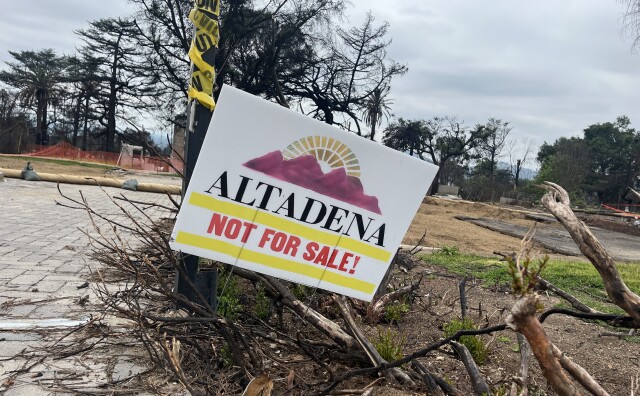Congress has cut federal funding for public media — a $3.4 million loss for LAist. We count on readers like you to protect our nonprofit newsroom. Become a monthly member and sustain local journalism.
Yes, Heat Waves Do Feel Hotter In Low-Income Neighborhoods

It's not your imagination. Summer heat often feels hotter in low-income neighborhoods than it does in wealthier ones.
Researchers at UC Davis looked at the 20 largest metropolitan areas in the Southwest and found that the poorest neighborhoods were on average four degrees hotter than the wealthiest neighborhoods. Why the thermal inequity? Wealthier areas tend to have more green spaces, shade and energy-efficient buildings that keep them cooler.
In California, the biggest disparities were found in the Inland Empire and Palm Springs, where low-income neighborhoods were six to seven degrees hotter than other communities. The researchers also found disparities by race.
"We looked at every racial demographic, and by far, the Latinx community unfortunately faced the highest thermal inequity. It was not even close," says Jake Dialesandro, the lead author of the study.
As climate change accelerates, some researchers are urging policy-makers to take action to reduce energy costs and prevent heat-related sickness and death in lower-income communities.
Our news is free on LAist. To make sure you get our coverage: Sign up for our daily newsletters. To support our non-profit public service journalism: Donate Now.
As Editor-in-Chief of our newsroom, I’m extremely proud of the work our top-notch journalists are doing here at LAist. We’re doing more hard-hitting watchdog journalism than ever before — powerful reporting on the economy, elections, climate and the homelessness crisis that is making a difference in your lives. At the same time, it’s never been more difficult to maintain a paywall-free, independent news source that informs, inspires, and engages everyone.
Simply put, we cannot do this essential work without your help. Federal funding for public media has been clawed back by Congress and that means LAist has lost $3.4 million in federal funding over the next two years. So we’re asking for your help. LAist has been there for you and we’re asking you to be here for us.
We rely on donations from readers like you to stay independent, which keeps our nonprofit newsroom strong and accountable to you.
No matter where you stand on the political spectrum, press freedom is at the core of keeping our nation free and fair. And as the landscape of free press changes, LAist will remain a voice you know and trust, but the amount of reader support we receive will help determine how strong of a newsroom we are going forward to cover the important news from our community.
Please take action today to support your trusted source for local news with a donation that makes sense for your budget.
Thank you for your generous support and believing in independent news.

-
People moving to Los Angeles are regularly baffled by the region’s refrigerator-less apartments. They’ll soon be a thing of the past.
-
Experts say students shouldn't readily forgo federal aid. But a California-only program may be a good alternative in some cases.
-
The program is for customers in communities that may not be able to afford turf removal or water-saving upgrades.
-
More than half of sales through September have been to corporate developers. Grassroots community efforts continue to work to combat the trend.
-
The bill would increase penalties for metal recyclers who possess or purchase metal used in public infrastructure.
-
The new ordinance applies to certain grocers operating in the city and has led to some self-checkout lanes to shutter.







